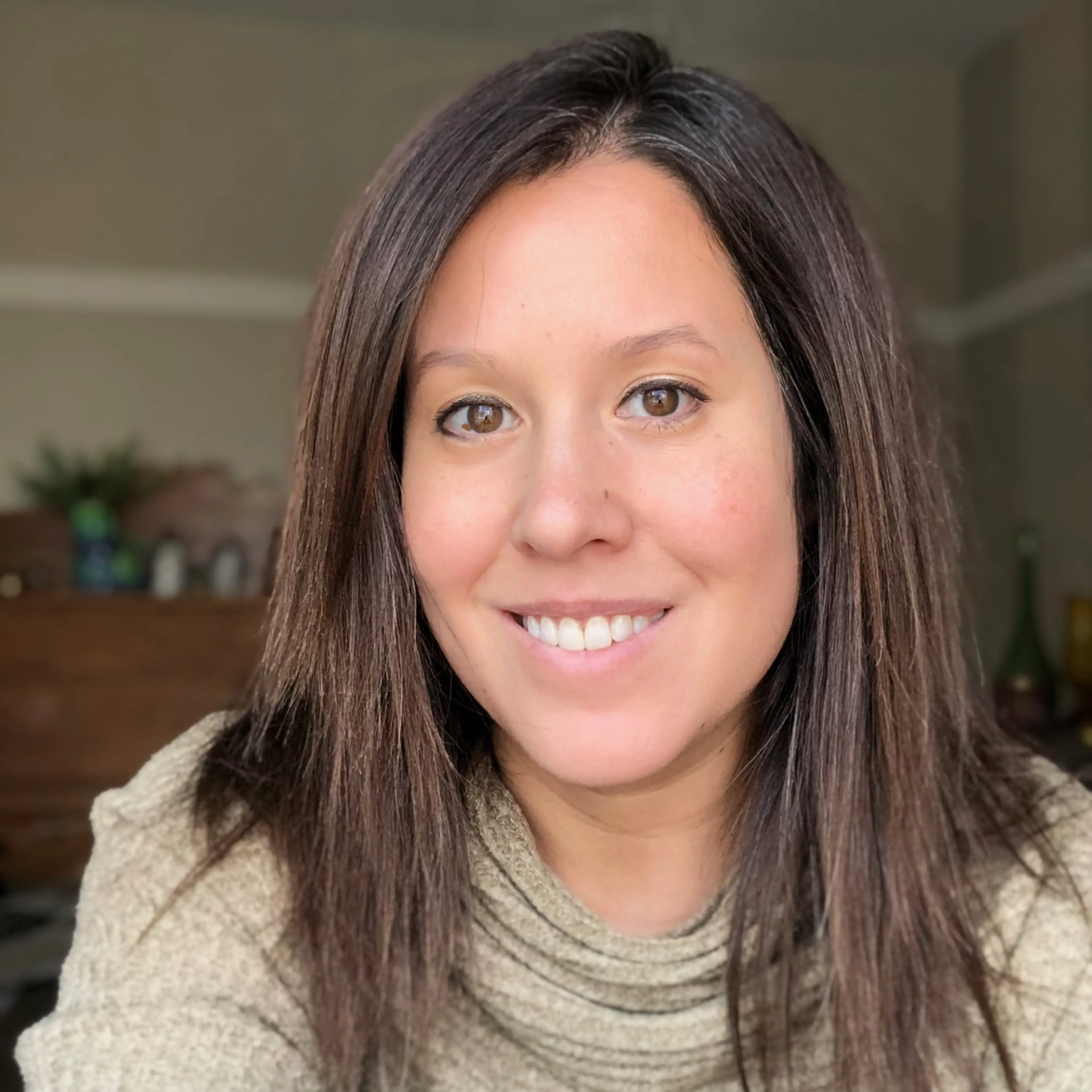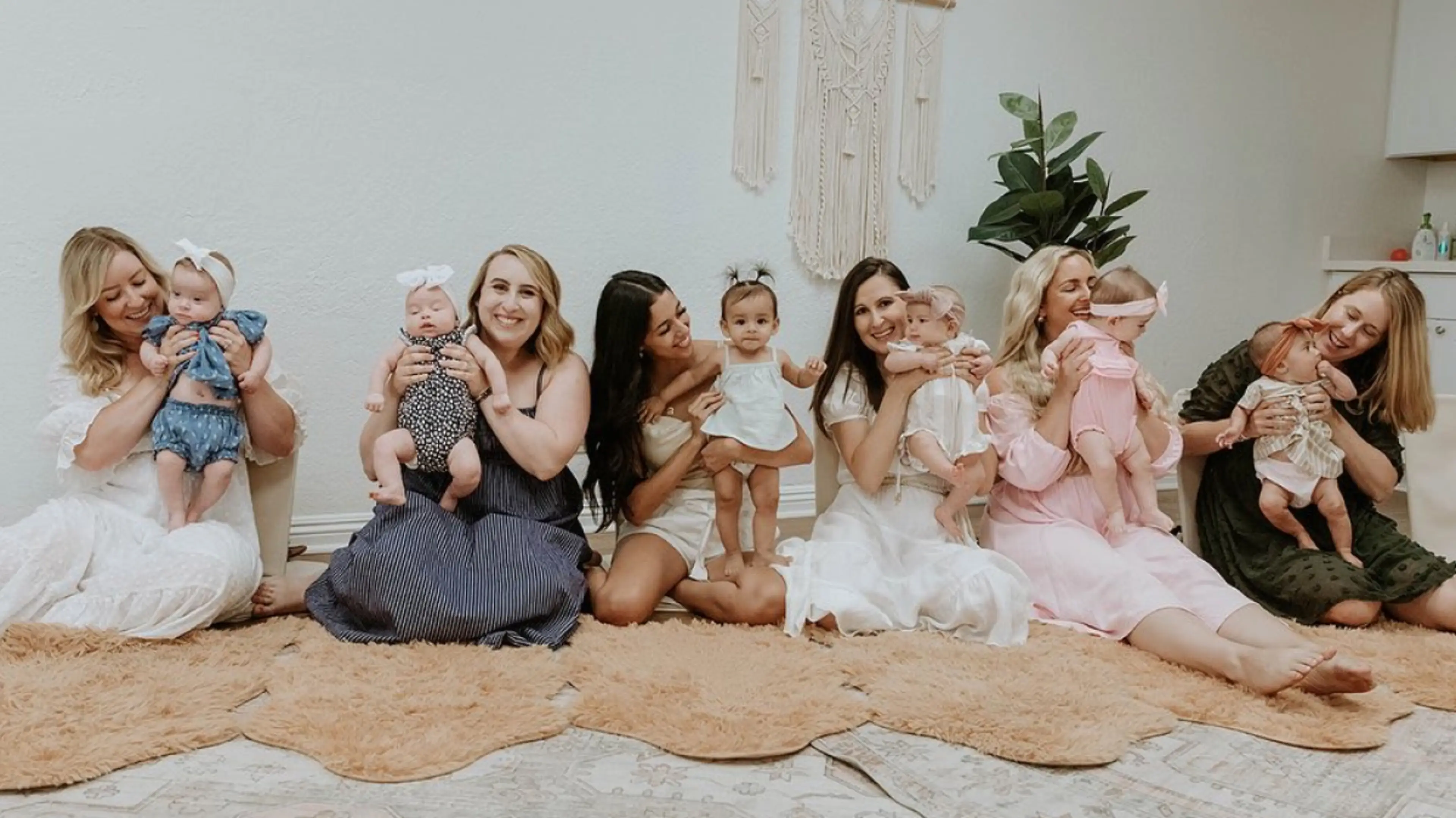If you’ve had a baby in recent weeks or months, chances are you’ve felt lonely or just plain sad at some point. This is a pretty universal experience for new moms—you’ve gone from being a relatively carefree, social person to being exhausted and stuck at home with a new baby, not to mention recovering yourself. But, there is also something much bigger at play. In the U.S., we are in the midst of a loneliness epidemic1 that worsened significantly during the pandemic, according to the U.S. Surgeon General—and it’s not getting a whole lot better.
A 2020 Harvard survey2 found that 61 percent of adults ages 18 to 25 reported feeling serious loneliness, compared to 39 percent across the general population. The reasons are complicated, but have something to do with the rise of social media and the boom in pandemic-era services, like grocery delivery and virtual meetings, that make seeing another person outside of your house—let alone making friends—a rarity. “I think the price of independence can be really painful,” says Dr. Alexis Menken, a maternal mental health psychologist. “Social isolation has unintended consequences.”
One of those consequences is the further isolation of new mothers who are already embarking on a particularly vulnerable journey. It’s harder to find friends, let alone bring them into your inner circle. You may live 2,000 miles away from your closest loved ones, and in-office conversations that might have led to real friendships have turned into stilted 30-minute meetings on a screen.
And yet, the research3 is pretty clear. New moms who have support,4 particularly in the form of other moms in the same new parenting stage, are much better off mentally. “At the end of the day, you don’t need 150 social media friends, you need one real friend that's going to come over for a cup of coffee or go for a walk with you,” says Dr. Menken.
While it’s not easy, building a social support network is so important—whether that happens before you’re pregnant, while you’re pregnant, or when you really need one in the 4th trimester. So, we talked with experts to understand why you should make the effort, no matter how difficult it might be, to find your mom circle, plus some thoughts from seasoned moms who did manage to find their people in all sorts of ways, despite the odds.
New Motherhood Is a Universally Lonely Experience
Think about it: becoming a mom is one of life’s biggest curveballs. No matter how much you prepare, there’s a learning adjustment that comes with taking care of a new baby on close to no sleep. Your body looks different, you feel different, and your identity is changing in real-time. It’s a lot for anyone to manage on their own. Even if you have a supportive partner and a loving family, it can still feel like you're alone in this enormous transformation.
“We’re doing something for the first time and trying to figure it out, and then we also might start to believe that no one knows what we’re going through, that we’re in this alone, and that can be very isolating,” says Danielle Bayard Jackson, a friendship educator and mom to a 2- and 5-year-old. “I remember being in the trenches of new motherhood. I felt like my friends had left me behind when I’d look on social media and they’d be out doing stuff,” she says.
For Dr. Danielle Wright-Terrell, a mom to a 1.5-year-old, ob-gyn, and owner of Honey, a postpartum coaching business, the loneliness came from not being able to ask her family and friends for help. “You’re given this idea that you have to build the biggest, best registry—you get the best tools and the most expensive things—and you should be good to go to do this all on your own,” she says. “Then when you get to postpartum, and you have all the tools and resources, you realize the key thing that’s missing is the support,” she continues. “Culturally, I just think that we're not empowered to say that we need help.”
Both Dr. Wright-Terrell and Bayard Jackson’s own experiences with postpartum loneliness spurred them to help other new moms. Dr. Wright-Terrell created a safe place for other postpartum people to get the support they need through online resources and mom groups, while Bayard Jackson works with new moms to help them make meaningful social connections with other women.
“Know that it’s not always going to feel so difficult and lonely, and you need to hold tightly to that truth,” says Bayard Jackson.
Mom Friends Can Help Protect Your Mental Health
If you’re still not convinced that having new mom friends, or social support in general, is essential, let’s look at the facts. “Clinically, new mothers need social support for all kinds of reasons,” says Dr. Menken. “Some of it is practical. Some of it is like someone to hold the baby when you shower or someone to help you figure out how to swaddle,” she says. Mom friends also have a way of uncovering and sharing resources that may be helpful for you, even if they can’t provide that support themselves, says Bayard Jackson.
Then there’s the emotional support, which can take a number of different forms. One is in validating your experience, says Bayard Jackson. “Research shows5 that when you are distressed and you go and gather with others, especially as a woman, it drops your cortisol, which is a stress hormone, and increases your oxytocin,” she says. “So, literally having time to talk to friends when you are stressed, reduces the stress and makes you feel better,” she says.
It can also look like commiserating with people who understand that all of this new parenting stuff is hard, says Kara Weiland, a perinatal mental health therapist. “In any challenging life transition, it’s just good to know that people have your back, even if it's just to listen, she says. “Getting friendly with someone who's a more veteran parent is also great so that they can kind of snap you back into reality about all the little developmental things your baby goes through—that can be really valuable insight.”
Your mom circle will also understand what it feels like to become a mom. “We are social human beings and we know ourselves best in our relationships to other people,” says Dr. Menken. “And I think that profound shifts that happen with new motherhood, the identity shifts, often women become friends with other new mothers. They're discovering a new sense of self, a new way of being in the world. And it's really helpful to do that in a relationship with other women who are in the same place at the same time,” she says.
When Dr. Emily Spaeth, 35, was newly postpartum with her first child, she made a huge decision to force herself and her three-month old out of the house to attend a new mom’s support group that met every Thursday at a coffee shop. “It was my first time out of the house, and I was really wanting to find a community, “ she says. “I was able to see all these people who had a three-month-old and talk about the four-month sleep regression and other things we were all wondering,” she continues. “It was so grounding and reassuring to be surrounded by people who were also sleep-deprived,” she says.
Admittedly, Spaeth, who now runs her own new mom support groups, says the people she met weren’t necessarily friends she would have made outside of this bubble, but having children the same age helped them all connect. “Motherhood can be so isolating, and I had weeks where I didn’t leave the house until Thursday morning, when I knew at least one other person would be there at the coffee shop,” she says.
All of that empathy and understanding acts as an invisible force field, softening the hard parts, the sadness, the loneliness that comes with figuring out this new mom identity. And it serves a really important purpose—to protect your mental health during such a tender time. “There's been plenty of research that shows peer support interventions have great benefits in terms of shielding moms from having postpartum blues exacerbate into postpartum depression,” says Dr. Wright-Terrell.
Having someone in her life who could recognize a perinatal mood disorder is something Jillian Amodio, 34, wishes she’d had during a severe bout of postpartum depression after having her son. Now a licensed therapist, Amadio has some advice for new moms whose loved ones may not be so well-versed in maternal mental health. “Talk about the risks and the signs of postpartum depression with your providers and with your family, and come up with a proactive plan,” she says. “It’s so much better to be prepared, and have somebody waiting in the wings to notice these things so you can enact the plan you came up with together.”
Support May Come in Different Forms, and That’s Okay
Yes, building a robust in-person mom support group is the gold-star goal when you’re newly postpartum, but it’s also pretty lofty. Having one or two mom friends who you get to talk with in short bursts and shared looks while your kids are enjoying storytime is also a good compromise. But even that may not be realistic for everyone. That’s why it’s a good idea to look for support in unexpected places, too.
For many of us, that means staying in touch with our long-distance friends, says Weiland. “I have several clients talk to me about how valuable it is to have friends in different time zones, because they’re up in the middle of the night, and they know at least someone else is up, too.”
When Abbey Sangmeister, 42, decided to become a single mom by choice, she joined a Facebook group of like-minded women. In that group, she met two other single moms who she clicked with right away—and both happened to live in completely different parts of the country. All three women had their kids around the same time and have been through similar life experiences since. “We’ve never met in person, but we text every single day,” she says.
If new mom friendships are hard to come by, you can also enlist your family for help, says Dr. Wright-Terrell. “You can make a game plan with them, like, ‘Hey, I want you to connect with me and do some check-ins,’” she says, “and that can be a text, writing a letter, or sending funny gifts to each other, we just need that connection.”
And finally, don’t be afraid to hire a doula to help you with practical needs if you don’t have a close friend or family member nearby, says Dr. Wright-Terrell. “I would 1000% invest in a doula to help with daily tasks, especially in the postpartum period.”
If you’re feeling down about your lack of a village, we get it. It’s tough out there. But making small strides to open yourself up to new friendships can help you make meaningful connections to fill your social cup. And remember, it’s okay to think of the term “mom friend” loosely. “It's nice to have people who are nearby, especially moms who have similar values and that you enjoy spending time with to get your social needs met in person,” says Weiland. But messaging a mom friend you met online or texting with your bestie at 3 a.m. has a place, too.
Read Next: 20 Tips to Make New Mom Friends Even If You Don’t Feel Like Leaving the House

